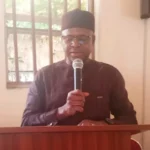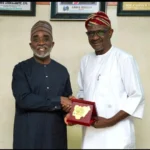By Ibukun Emiola
Prof. Marcelo Knobel, Executive Director, The World Academy of Sciences (TWAS), says strong ethical frameworks and inclusive global standards will prevent Artificial Intelligence (AI) from further widening global inequalities.
Knobel told the News Agency of Nigeria (NAN) that ethical considerations must be embedded from the outset of AI development, especially to protect marginalised communities in developing countries.
“There’s a significant risk that AI systems can worsen existing inequalities if deployed without assessing their social impacts,” he said.
He listed algorithmic bias, data sovereignty, and personal data protection as top ethical concerns, noting that researchers in the global South need both tools and training to manage AI responsibly.
Knobel says TWAS aligns with UNESCO’s ‘Recommendation on the Ethics of Artificial Intelligence’, which promotes human rights, justice, and environmental sustainability.
He stated that data privacy must be maintained through strong governance frameworks, anonymisation, and informed consent processes that are sensitive to cultural and local contexts.
“TWAS can promote data sovereignty by expanding training on data governance and advocating equitable international research collaborations,” he said.
He warned that current AI governance frameworks were fragmented and underrepresented, creating regulatory inconsistencies and power imbalances.
“Finding this balance requires institutions to integrate ethical considerations from the earliest stages of AI development, rather than treating them as an afterthought.
“This means involving diverse stakeholders—including representatives from communities that might be affected by these technologies—in the planning and development process.
“Institutions should establish clear governance structures that provide oversight without stifling innovation.
“This might include ethics review boards with expertise in AI applications, mandatory impact assessments before deployment of new tools, and ongoing monitoring of AI systems to identify unintended consequences,” Knobel said.
According to him, transparency is also crucial, both in how AI systems function and in acknowledging their limitations.
He stated that scientists and research institutions must be willing to pause development when ethical concerns arise and redirect efforts when necessary.
“Finally, capacity building around ethical AI should be prioritised, especially in developing countries.
“By equipping scientists worldwide with the knowledge to evaluate AI systems critically, we can ensure that innovation proceeds responsibly across all contexts.
“Additionally, many current approaches focus narrowly on specific applications rather than establishing foundational principles that can adapt to emerging capabilities.
“We need flexible frameworks that can evolve alongside the technology, while maintaining core ethical commitments,” Knobel said.
He said that TWAS was preparing to join global AI governance coalitions and consulting fellows to develop policy positions that reflect the unique priorities of the global South.
“We are mapping international initiatives and identifying entry points where our network can contribute meaningfully, particularly in areas like climate adaptation, public health, and education,” Knobel said.
He also announced that TWAS would be holding a high-level roundtable on AI ethics during its General Conference in Brazil in September. (NAN)(www.nannews.ng)
Edited by Remi Koleoso and Moses Solanke












